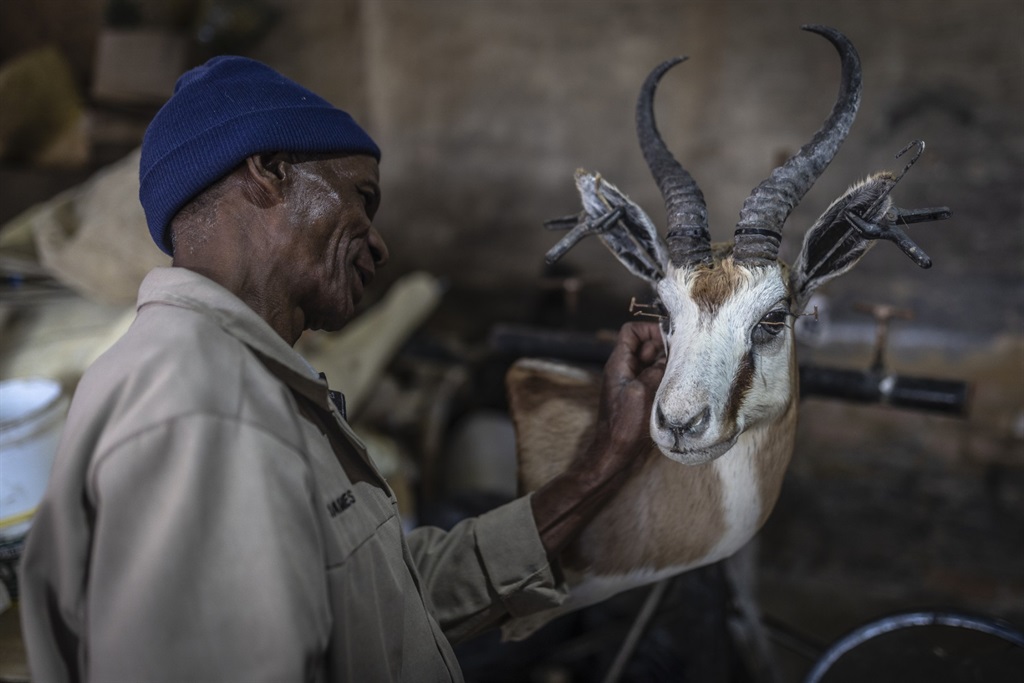- A new UK bill bans the import of hunting trophies.
- The aim is to help protect endangered animals.
- This would scupper demand for the centuries-old craft of stuffing hunters' quarry for display.
Workers in Pieter Swart's tanning and taxidermy workshop are busy skinning impala heads, bleaching buffalo bones and softening zebra skins.
His business in South Africa has thrived for years, but the 58-year-old says it is now threatened by a British law sponsored by animal activists.
The bill, which bans the import of hunting trophies, could open the way for a deluge of similar legislation, Swart worries.
This would scupper demand for the centuries-old craft of stuffing hunters' quarry for display, leading to painful job losses in top international hunting destinations in southern Africa, he says.
"We are very much concerned," Swart, a zebra skull sitting on his desk, tells AFP. "The law could create a domino effect".
The British legislation, which aims to help protect endangered animals, was approved by UK lawmakers in March.
Covering thousands of species, including lions, rhino and elephants, it reflects a broader shift in western societal views on hunting against a backdrop of declining global wildlife numbers, according to animal rights groups.
"This is very much the start of a change in attitudes amongst (European) countries," says Matthew Schurch, wildlife expert with animal welfare group Humane Society International.
Similar bills are being considered in such countries as Italy, Belgium and Spain, according to HSI.
Conservation income
The law is backed by numerous celebrities including model Kate Moss and football presenter Gary Lineker, but African conservationists and those in the hunting business say it is misguided.
Trophy hunting - where hunters pay thousands of dollars for the right to kill usually big game animals like elephants and lions - has long been controversial.
Proponents contend that the killing of a small number of selected, usually old animals generates much needed income for conservation and anti-poaching efforts and support local communities.
Trophy hunting contributes more than $340 million a year to South Africa's economy supporting some 17 000 jobs, according to a 2018 study.
Hunters often bring home parts of the animals as trophies.
These are processed by taxidermy firms that employ about 6 000 people in South Africa, according to Swart, leader of trade group South African Taxidermy and Tannery Association.
Piles of skins, skulls, horns and bones lay in his workshop, waiting to be turned into rugs and ornaments.
Thousands of carcasses are processed at the Rayton facility, near Pretoria, every year.
Most come from culling done by game reserves, while a smaller part is brought in by international hunters, says Swart.
"Hunting and culling are one of the processes of managing the animals. And to waste a skin like this...and to just let it degrade is not cost effective," Swart, sporting a grey goatee, says pointing to a zebra bust hanging on the wall.
A full mount taxidermy of a rhino costs more than R130 000.
"If they are going to ban this job, ... I am not going to manage to feed my family," says Elias Pedzisai, 45, who works his "magic" bleaching skulls at Swart's Afrikan Tanning & Taxidermy firm.
Hunters from China, Russia
Critics say shooting wild animals for fun is cruel, wasteful and pushes endangered species closer to extinction.
For South Africa's National Council of Societies for the Prevention of Cruelty to Animals, hunting an animal for it to be mounted on your wall is "questionable".
"There are far more ethical and humane ways of generating income," said spokeswoman Keshvi Nair.
While Britons make up a small share of trophy hunters in South Africa, the law - which is being scrutinised by the upper house of parliament - is already causing damage, says Swart.
If more countries were to follow "we will see a considerable part of our market come to a grinding halt," says Douglas Cockcroft, director of Splitting Image Taxidermy, another company employing more than 100 people.
The prospect already has South African taxidermists pursuing new opportunities.
"There have been inroads into the Chinese and Russian markets," Swart says.
"Hunters from those countries that in the past didn't come here now are coming to South Africa on a more regular basis."




 Publications
Publications
 Partners
Partners
























